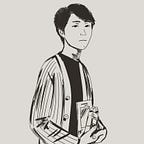The Yuha Archive :: “SONICFOLIO SCORES” Episode 5:: Life Life — FIELD NOTES
SONICFOLIO SCORES was a collection of graphic scores jointly produced by The Yuha Archive (Toronto), and The Operating System Liminal Lab (New York). From August 2021- August 2022, eleven graphic scores were produced. Each graphic score endeavored to introduce new perspectives in musical notation and interpretation. The full archive can be found HERE
“Life Life” is the fifth installment of the SONICFOLIO SCORES Project supported by the Operating System & Liminal Lab. To stay up to date with the Yuha Archive SONICFOLIO Series, follow the project on Soundcloud or the Archive’s website. For the introduction to this series here on the OS’ Medium platform, click here.
Improvisation, in art, music, or life, whether by material or metaphysics, teeters on a greater more. When a moment finds happenings, the interval between what is anticipated and the wait within the aftermath’s threshold expands into the open. In Abstract Expressionism, such moments often rest on an experience, or a so called “all over” continuity. The gestural, spontaneous, and the accidental often polarize finitude towards instruction, and the semantics of aleatory itself, that canvas action metaphorized for personal biography. Michael Fried often alludes these greater mores as a tactile testimony to untouched objecthood; that the actual number of modular units in given pieces, or inherent space, gives rise to the illusion of arbitrary material, and the piece itself when seen as a fragment of, or cut into, results in an aftermath infinitely larger. Continuity within an aftermath, is thus endless, of an indefinite duration, and a confrontation towards a hindsight sense as process. From the point of view of a greater more, derives from a preconceived rooted simplification that continuity within aftermaths, seeks an apparent fullness. Just with spontaneity towards the greater more, the aftermath masks a deficiency in content.
I composed the graphic score “Life Life” to document the intervallic thresholds that mitigate preplanned practice and improvisation. Life Life sources its sounds from a degenerative Yamaha upright piano tampered by nature to examine impermanence and imperfection as tangible forms of musical expression. By undergoing many months of decay left outdoors, the piano that is decentered from anthroposcentric ideals, and allows for temporal and restorative interplays in improvisation.
Stanford Cheung engages across a variety of creative hubs as a classical pianist, sonic artist, improvisor, and multi-disciplinary poet. From concerto performances with orchestras, poetry recitals, to electronic free-form improvisation for art installations, Cheung has collaborated internationally with a variety of artists and scholars, including Morgan Fisher, Steven J Fowler, Shahzad Ismaily and Nobuo Kubota. Cheung’s commissioned projects have been exhibited or forthcoming at the 43rd Rhubarb Festival (Buddies in Bad Times), Osaka University OCCA, Edinburgh University, Christchurch University, Banff Centre for the Arts, Orpheus Institute, Kitakyushu Centre for Contemporary Arts, Tokyo Poetry Journal, among others. Presently, Cheung is pursuing his Doctoral degree in music at McGill University where his research is dedicated to the Japanese composer Ryuichi Sakamoto. He runs a multimodal soundscape project called The Yuha Archive.
You can find him here: https://stanfordcheung.com/
